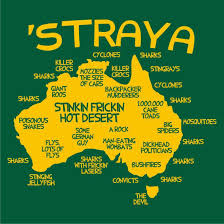After spending a year exploring Melbourne and Sydney the time came for her to earn some money.
A friend in Sydney said she should work for herself and I should help. Great!
Nevertheless it was good advice and she found a small business running jet skis in Mission Beach, a small town near Cairns in Far North Queensland.
We bought the business and Alison, now known as Ali, became a first-time business owner.
Every morning, at the crack of dawn, Ali and her friend Joe drove a tractor from their lockup towing 6 jet skis and unloaded them on the beach. They rode two skis and towed the other four 7kms across beautiful clear blue waters to Dunk Island in the Great Barrier Reef Heritage area.
On the island was a large holiday resort that supplied our customers.
Each day, Ali and her team ran tours round the beautiful island accompanied by exotic birds, colourful fish, and the occasional whale, to places that could only be reached in small boats and jet skis, and it was a great lifestyle.

Then, on 20 March 2006, Larry paid us a visit.
Larry was a Category 5 Cyclone that built up in the Pacific Ocean and roared ashore right over Mission Beach demolishing almost everything in its path, and that included the resort that supplied our customers.

Luckily our jet skis were back in the lockup on the mainland so all was not lost, except we no longer had any customers.
Along with other businesses hit by the cyclone we struggled on for a while.

We hired out jet skis from the beach encouraged by the news that the resort was being rebuilt and would soon reopen, and after several delays it reopened eight months later.
But it had it’s own jet skis.
On that fateful day in March 2006 we went from having a great lifestyle business to having no business at all. A cyclone and a big company had put us out of business.
So how does Traveljunkies figure in this?
Back in 2002 we had produced a small newsletter promoting our jet ski business and a few other businesses in the North Queensland area.
In 2006 with our jet ski business gone we broadened the range of activities including articles about the Great Barrier Reef, the tropical rainforest and activities such as scuba diving, fishing, 4wd trekking and sky diving onto the beach. We also extended the area we covered and interest grew rapidly and with the advent of social media, the word spread and we were soon getting enquiries from beyond Australia.
By this time Ali had moved to NSW and gone back to her first love, caring for animals. She had many years experience as a vet nurse in the UK and was much in demand in Australia, so she had little difficulty in finding employment.
So it fell to me to continue to develop Traveljunkies which I treated like a hobby rather than a business and I’ve made many friends and contacts around the world.
Then I heard from a friend in Honduras.
Hello Cliff,
The information is correct although we have sad news. Tyll’s Dive will close down begin May this year.
Our small business could just not survive and compete against new dive businesses with a good money back up.
As of now we have no one interested in buying the name and the permit owner of the building is not interested in new tenants, which makes it difficult to sell the business as a whole package.
After we close down we will take a couple of weeks to relax and enjoy the island again, then most likely going back to Denmark for a while and find out what will happen from there and what options we have.
Thank you for your support over the years.
Dorte
Tyll’s Dive
Roatan, Honduras
A big company had closed down her business and that prompted me to do what I could to help small businesses. After all, we were once a small business that was shut down by a big company.
So I started promoting small businesses in the travel and activities industries giving them free one-line adverts in Traveljunkies. A bit like yellow pages.
We’ve been doing this now for nearly ten years and have made more than a quarter of a million referrals to small businesses around the world, and you can see some of our customer’s comments in Testimonials.
When the pandemic hit in 2020, we were asked if we could do more to help our clients, and with small businesses finding it hard to get customers I decided to offer premium adverts for a small fee.
We carried out tests posting simple adverts and this was very successful, increasing “Getting Found” by an average of 425%.
Bringing my story up to date, we are redesigning the Traveljunkies website to include Premium Listings for a small annual fee that in most cases will be quickly recovered by additional customers. In fact, just adding one extra customer will usually recover the fee we charge to display a Premium Advert for a whole year.
With lockdowns and travel restrictions worldwide, timing has been important and we will be offering this option in 2023.
In the meantime, if you own or manage a small business that qualifies for a free advert in please take a look.
Thank you for taking the time to read our story and I hope you found it interesting and helpful.
If you think joining us at Traveljunkies could help your business we’d be delighted to welcome you.
With my very best wishes
Cliff Chapman
Traveljunkies
Helping you find customers by helping customers find you
So remember, if you’re looking for new places to go, or exciting things to do, or you just want somewhere to stay, hop over to Traveljunkies.
And if you own or manage a travel or adventure business and you don’t have a free advert then Traveljunkies is the place for you.



 Follow
Follow









:max_bytes(150000):strip_icc():format(webp)/TAL-tourists-sigiriya-sri-Lanka-WLCMASIANDEST0125-d5608fddc86e4b0f984c8e15ea637b0b.jpg)
:max_bytes(150000):strip_icc():format(webp)/TAL-sigiriya-sri-Lanka-WLCMASIANDEST0125-c81578439f914c3cbcffe18de1929948.jpg)